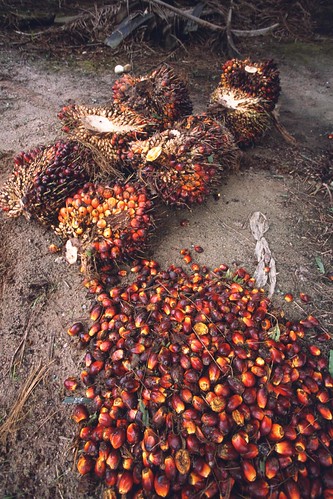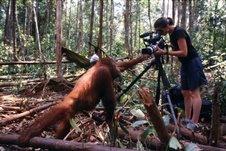A film that could save lives
A TRAINING VIDEO TO PROTECT ORANGUTANS
CALL FOR BRITISH COMPANIES TO GET INVOLVED
"The great apes are our kin... Sadly, however, we have not treated them with the respect they deserve, and their numbers are now declining, the victims of logging, disease, loss of habitat, capture, and hunting... Great apes cannot be conserved for free... We need ordinary people in their millions to love an protect them. We need governments and companies to 'adopt' them and the places where they live. We need to turn the tide of extinction that threatens our nearest living relatives."
Kofi A. Annan
Secretary-General of the United Nations
World Atlas of Great Apes and their Conservation, 2005
If you’ve been following our site, you will already know that orangutans are under serious threat when they are found in oil palm plantations. The Sumatran orangutan is vying for the unenviable position of being the first great ape likely to go extinct within our lifetimes. We need companies to do their bit for great ape conservation - one way they can make a huge difference is to back the project we are proposing below, an idea the orangutan conservation organisations who would be involved are desparate for us to make.
We are developing a training video that will inform plantation workers what to do when they encounter an orangutan in their plantation. Working in collaboration with the Sumatran Orangutan Society and the Borneo Orangutan Survival Foundation we plan to make a health and safety style training video which we will be shown to workers in the oil palm plantations. The video will be an easy and effective way for plantation workers to learn what to do when encountering an orangutan.
The majority of plantation staff are migrant workers from Java or
The safety video will work to introduce workers to the orangutan in its true colours. It will include simple step-by-step instructions of what to do when an orangutan is spotted on a plantation, emphasizing the point that the workers should NOT try to capture or tie down the orangutan in any way. The reason that many orangutans are already seriously (often fatally) wounded before the rescue teams can reach them is that, despite having taken steps to alert the rescue team to the presence of the orangutans, the plantation workers have nonetheless undertaken to capture the animal themselves prior to the arrival of the team. A mature orangutan is immensely strong – it is almost impossible to tie up or capture an orangutan without first beating it unconscious. In order to stop this happening, the safety video will focus on giving clear instructions of which rescue centre to contact – these will be location specific – and will then recreate what will happen when the rescue team arrives. It will also provide information and images regarding the potential transmission of diseases between humans and orangutans should they come into contact with each other.
We intend that the video be made as a reconstruction of an orangutan rescue, filmed using members of the Borneo Orangutan Survival Foundation rescue team as well as plantation workers. Karaoke is very popular across
We are currently looking for UK-based businesses to help fund and support the production of this film.
Orangutans in oil palm plantations
If you are interested in finding out more please contact us.
Nick & Evie @ Cockroach Productions
cockroachproductions@gmail.com
Tel: 01823 451 790 / 07816 755 128
http://www.cockroach.org.uk/






